
Policy statement and recommended actions for early detection of breast cancer in the Eastern Mediterranean Region
Publication date: 2016
Breast cancer is the most common cancer among women in all countries of the WHO Eastern Mediterranean Region, and its impact is growing. This policy statement was published in 2016 with the goal of identifying the priority actions for Member States to Implement an early detection programme to detect breast cancer and precancerous lesions at an early stage when they are small and localized, thus reducing mortality from breast cancer.

Policy statement and recommended actions for early detection of cervical cancer in the Eastern Mediterranean Region
Publication date: 2016
The International Agency for Research on Cancer estimates that 15 000 cases of cervical cancer were diagnosed in the Eastern Mediterranean Region in 2012, with 8000 deaths due to the disease. This policy statement was published in 2016 with the goal of identifying the priority actions for Member States to implement an early detection programme to detect cervical cancer and precancerous lesions at an early stage when they are small and localized, thus reducing cervical cancer mortality rates.

Policy statement and recommended actions for early detection of colorectal cancer in the Eastern Mediterranean Region
Publication date: 2016
Despite comparatively lower incidence rates of colorectal cancer than in industrialized countries, a rising trend in the incidence of colorectal cancer has been observed in some countries of the Eastern Mediterranean Region. It has been estimated that 18 000 cases of colorectal cancer were diagnosed in men and 15 000 in women in 2012 in the Region. This policy statement was published in 2016 with the goal of identifying the priority actions for Member States to implement an early detection programme to detect colorectal cancer and precancerous lesions, at an early stage when they are small and localized, thus reducing colorectal cancer mortality rates.

Policy statement and recommended actions for early detection of breast, cervical, colorectal, oral and prostate cancers in the Eastern Mediterranean Region
Publication date: 2016
The impact of the growing burden of cancer in countries of the Eastern Mediterranean Region is evident, and necessitates implementation of suitable and effective cancer control policies. An important component of cancer control is the early detection of major types of cancer that benefit from effective treatment. This policy statement was published in 2016 with the goal of identifying the priority actions for Member States to implement early detection programmes for breast, cervical, colorectal, oral and prostate cancer to detect the cancer when it is small and localized, thus reducing cancer mortality rates.

Policy statement and recommended actions for early detection of oral cancer in the Eastern Mediterranean Region
Publication date: 2016
The incidence and frequency of oral cancer are low in almost all countries of the WHO Eastern Mediterranean Region with the exception of Pakistan, southern Saudi Arabia, Somalia, Sudan and Yemen. This policy statement was published in 2016 with the goal of identifying the priority actions for Member States to implement an early detection programme to detect oral cancers at an early stage when they are small and localized, thus reducing mortality from oral cancer.

Policy statement and recommended actions for early detection of prostate cancer in the Eastern Mediterranean Region
Publication date: 2016
Although the age-standardized incidence of prostate cancer in countries of the Eastern Mediterranean Region is lower than that in the high-income industrialized countries, the incidence is steadily increasing in those countries of the Region where data are available. This policy statement was published in 2016 with the goal of identifying the priority actions for Member States to implement an early detection programme to detect prostate cancer and precancerous lesions, at an early stage when they are small and localized; thus reducing prostate cancer mortality rates.
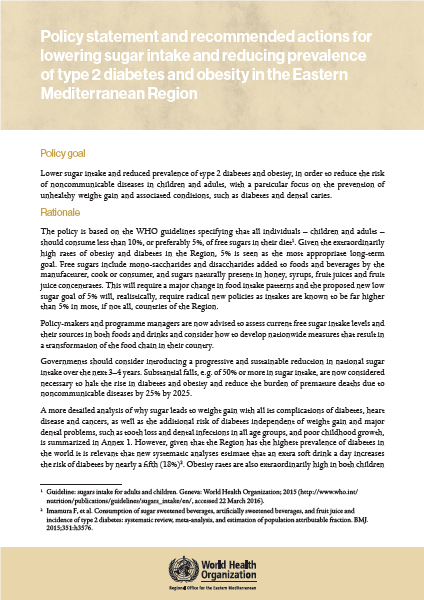
Policy statement and recommended actions for lowering sugar intake and reducing prevalence of type 2 diabetes and obesity in the Eastern Mediterranean Region
Publication date: 2016
This policy statement and proposed action plan is part of the WHO Regional Office for the Eastern Mediterranean’s effort to reach the global targets of halting the rise in diabetes and obesity and reduce the burden of premature deaths due to noncommunicable diseases by 25% by 2025. Through a four-phased approach, this policy statement provides the steps that countries should follow to reduce sugar intake, which consequently leads to maintaining a normal body weight, avoiding type 2 diabetes and also preventing dental caries in children and adults.
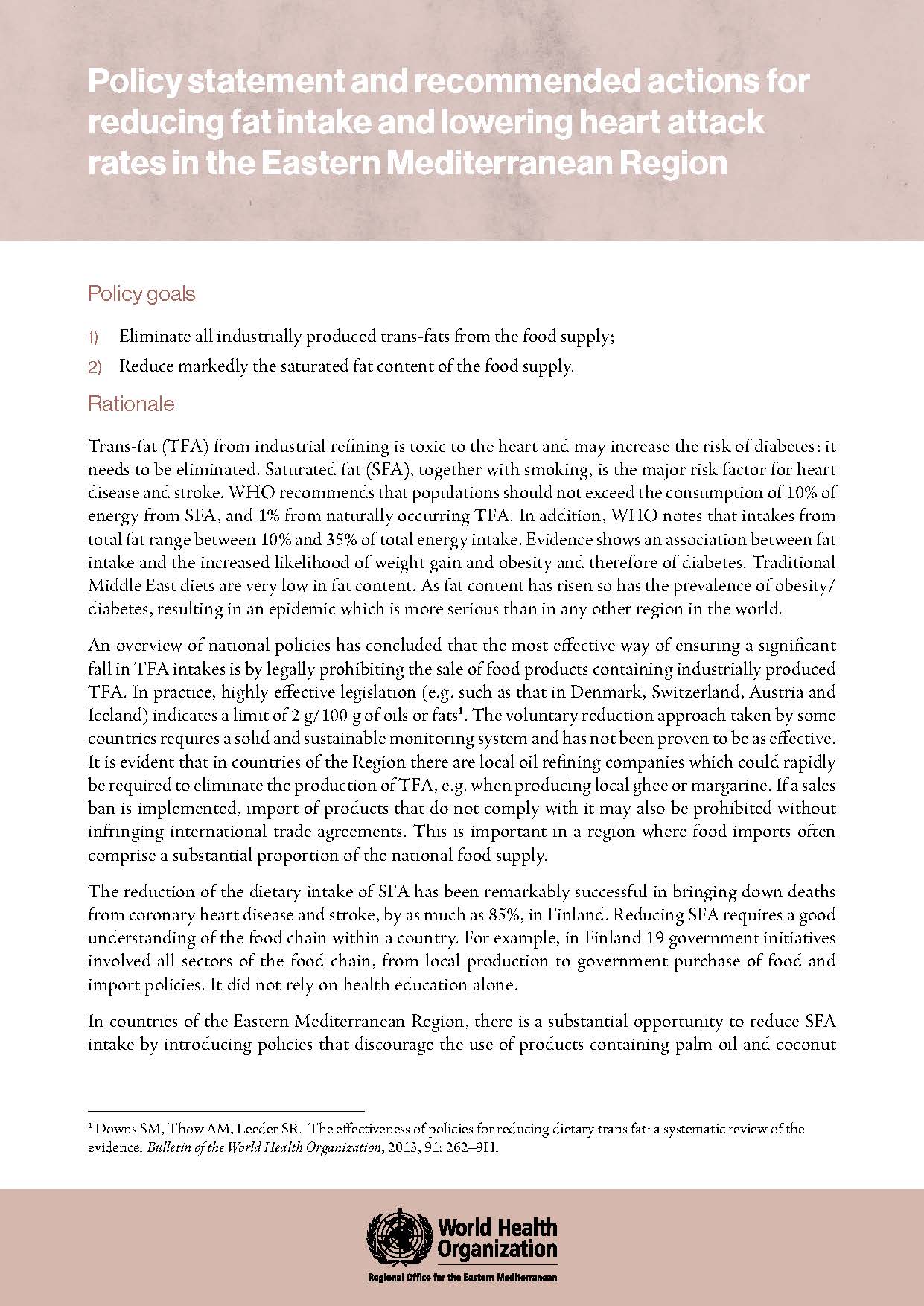
Policy statement and recommended actions for reducing fat intake and lowering heart attack rates in the Eastern Mediterranean Region
Publication date: 2014
This policy statement was published in 2014 with the goal of identifying the priority actions for Member States to eliminate all industrially produced trans-fats from the food supply as well as to reduce markedly the saturated fat content of the food supply. The suggested actions are divided into three phases which span over a period of two-years from 2014 to 2015.
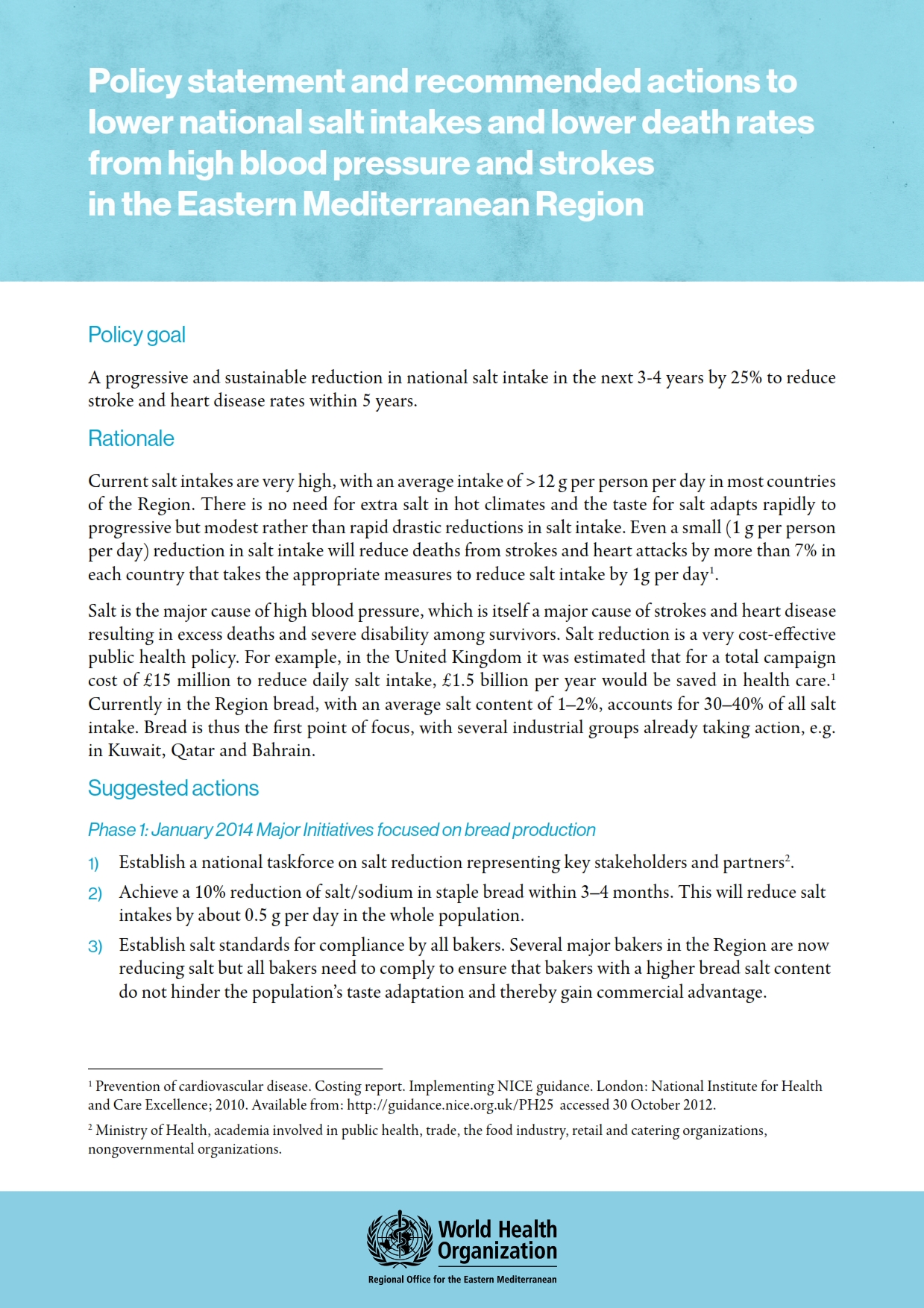
Policy statement and recommended actions to lower national salt intake and death rates from high blood pressure and stroke in the Eastern Mediterranean Region
Publication date: 2014
This policy statement was published in 2014, aiming to achieve progressive and sustainable reduction in national salt intake in the following 3–4 years by 25% to reduce stroke and heart disease rates within 5 years. It addresses the salt intake in countries of the Eastern Mediterranean Region and suggests several country-level actions for achieving salt reduction in three phases.
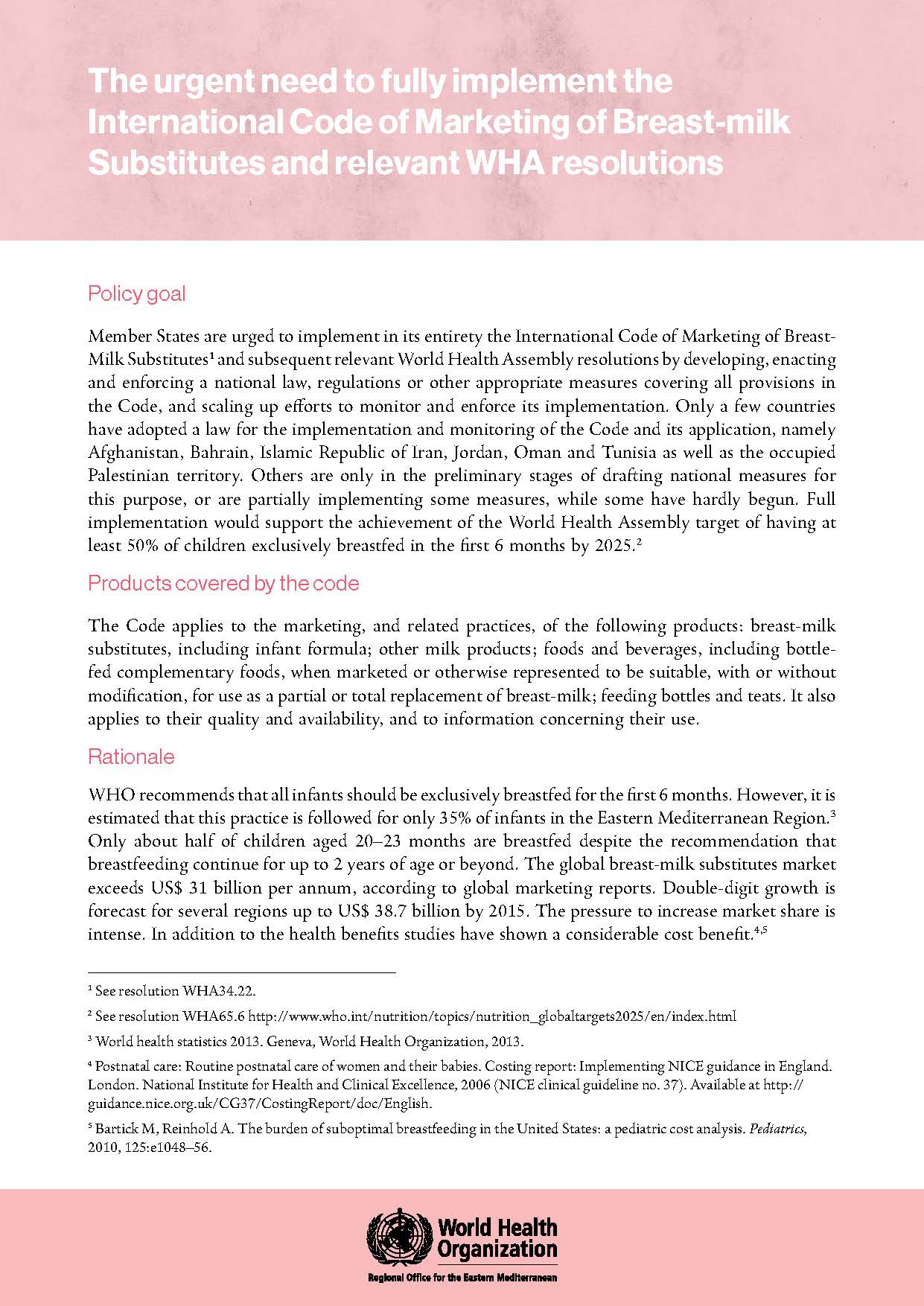
The urgent need to fully implement the International Code of Marketing of Breast-milk Substitutes and relevant WHA resolutions
Publication date: 2014
This policy statement was published in 2014 aiming to urge Member States to implement in its entirety the International Code of Marketing of Breast Milk Substitutes and subsequent relevant World Health Assembly resolutions by developing, enacting and enforcing a national law, regulations or other appropriate measures covering all provisions in the Code, and scaling up efforts to monitor and enforce its implementation.
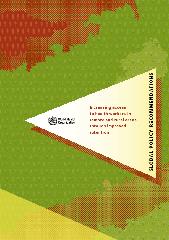
Increasing access to health workers in remote and rural areas through improved retention: Global policy recommendationsn
Publication date: 2010
Half the world’s people currently live in rural and remote areas. The problem is that most health workers live and work in cities. This imbalance is common to almost all countries and poses a major challenge to the nationwide provision of health services. WHO has therefore drawn up a comprehensive set of strategies to help countries encourage health workers to live and work in remote and rural areas. The guidelines are a practical tool that all countries can use. As such, they complement the WHO Global code of practice on the international recruitment of health personnel.
Related resources
WHO Global code of practice on the international recruitment of health personnel


